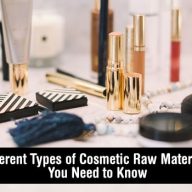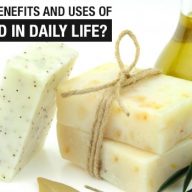All About Retinol: The Anti-Aging Ingredient
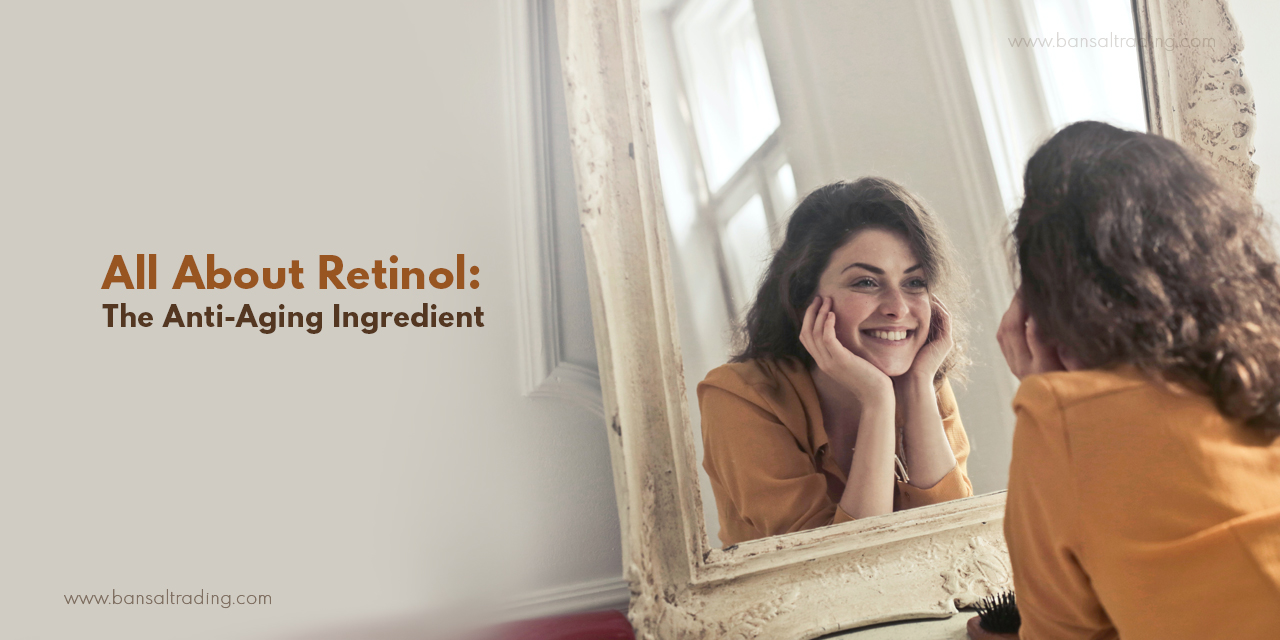
As we age, our skin undergoes various changes, such as the appearance of fine lines, wrinkles, and uneven skin tone. Addressing these ageing concerns becomes a priority for many individuals seeking to maintain a youthful and radiant complexion. Skincare plays a vital role in combating these signs of ageing and preserving the health and appearance of the skin.
Retinol: A potent Anti-Ageing Ingredient
Retinol has emerged as a powerful weapon in the fight against ageing. Derived from vitamin A, retinol has gained popularity in skincare due to its remarkable ability to promote skin renewal and rejuvenation. It works by stimulating collagen production, reducing the appearance of fine lines and wrinkles, improving skin texture and tone, and enhancing overall radiance. With its proven track record and scientific backing, retinol has become a go-to ingredient for those seeking effective anti-ageing solutions. Stearic acid is also another chemical found in skincare products.
Role of Retinol for Combating Signs of Ageing in Skincare
In the realm of skincare, retinol stands out as a potent weapon against the visible signs of ageing. Its ability to accelerate cell turnover, boost collagen production, and improve skin texture makes it a powerful ally for individuals seeking to combat wrinkles, fine lines, and uneven skin tone. As a proven anti-ageing ingredient, retinol has garnered widespread recognition and is recommended by dermatologists worldwide.
Its efficacy and versatility make it suitable for various skin types and concerns. By incorporating retinol into a skincare routine, individuals can harness the remarkable benefits of this ingredient and achieve a more youthful, vibrant complexion. Chemical raw material manufacturer in India contribute to the production of retinol and other skincare ingredients, ensuring a robust supply for the local industry.
What is Retinol?
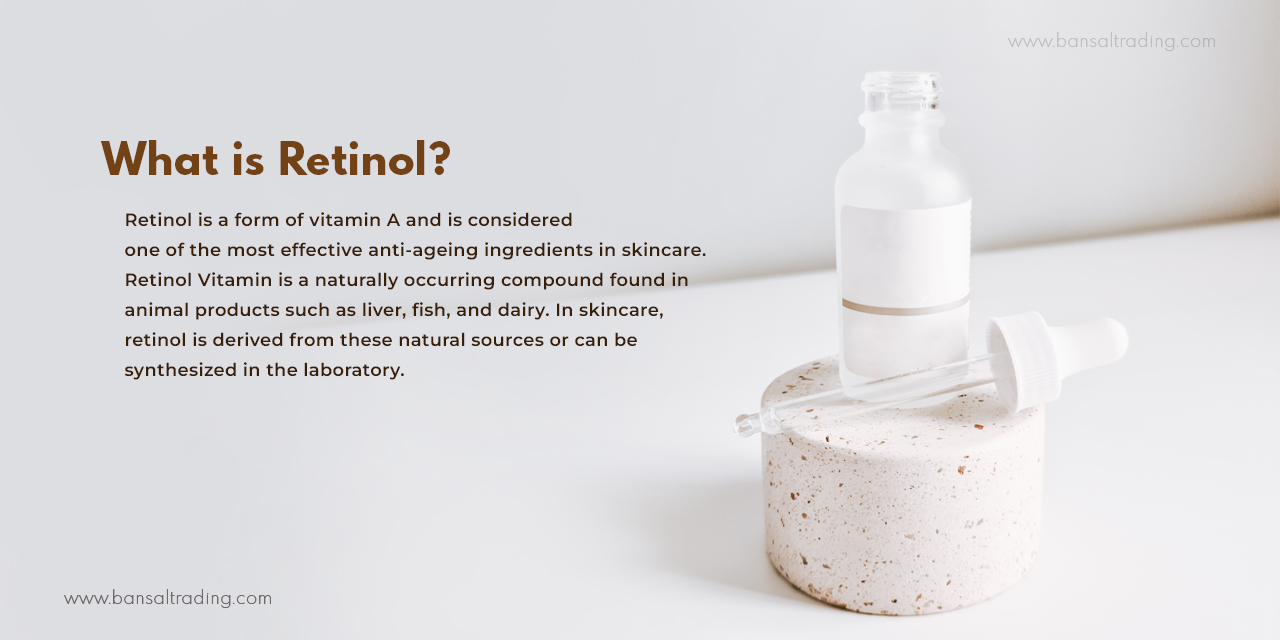
Retinol is a form of vitamin A and is considered one of the most effective anti-ageing ingredients in skincare. Retinol Vitamin is a naturally occurring compound found in animal products such as liver, fish, and dairy. In skincare, retinol is derived from these natural sources or can be synthesized in the laboratory.
Different Forms of Retinol Used in Skin Care Products
Retinol can be found in various forms and derivatives in skincare products. These include retinyl palmitate, retinyl acetate, and retinaldehyde. These derivatives are converted into retinoic acid, the active form of vitamin A, once applied to the skin. Each derivative has its own efficacy and stability profile, allowing for different options when incorporating retinol into skincare formulations. Jayant Agro-Organics Ltd is a leading supplier of different derivatives and forms of retinol.
Mechanism of Action and Retinol for The Skin Benefits
Retinol works by binding to specific receptors in the skin, stimulating the production of collagen and promoting cellular turnover. This helps to improve skin texture, reduce the appearance of fine lines and wrinkles, and even out skin tone. Retinol also has antioxidant properties, protecting the skin against free radicals and environmental damage. Additionally, it can help unclog pores and regulate oil production, making it beneficial for individuals with acne-prone skin.
Also Read: 8 Essential Anti-Acne Ingredients to Add to Your Skincare Routine
How to Use Retinol?
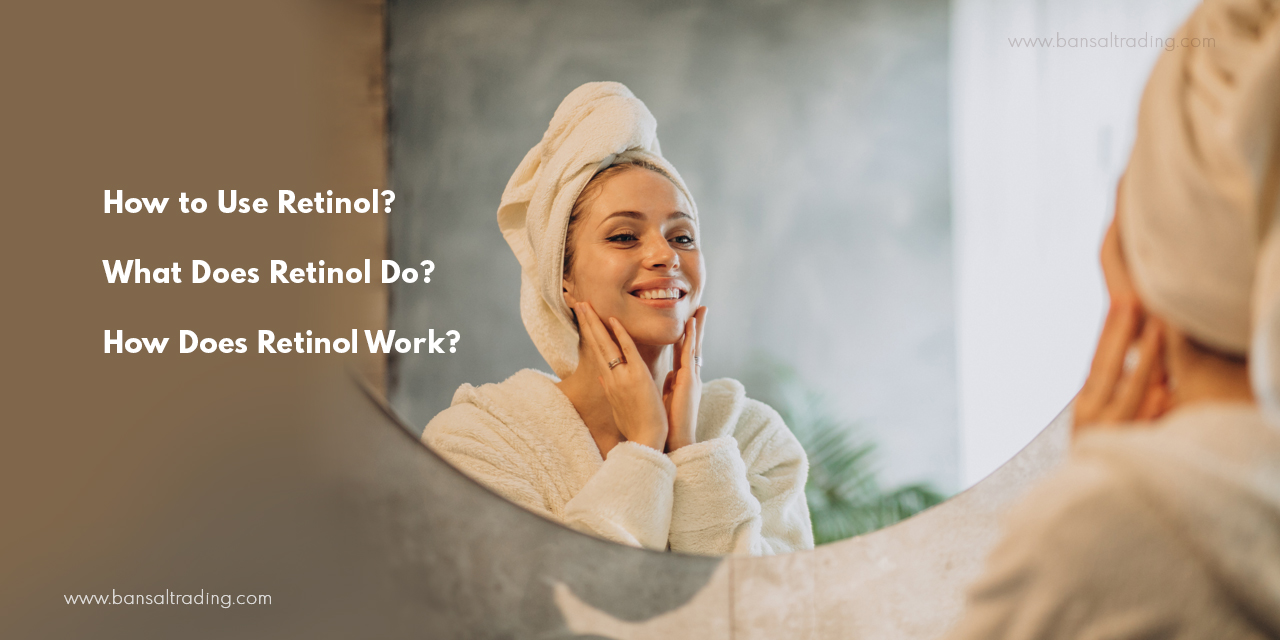
When incorporating retinol into a skincare routine, it is essential to start slowly and gradually increase usage to allow the skin to adjust. It is typically recommended to begin with a low concentration and apply it a few times a week, gradually increasing to nightly use. It is important to follow the instructions provided with the specific product, as some formulations may require special considerations such as applying to dry skin or avoiding sun exposure.
What Does Retinol Do?
Retinol benefits the skin, including reducing the appearance of wrinkles, fine lines, and hyperpigmentation. It improves skin texture, making it smoother and more even-toned. Retinol also stimulates collagen production, promoting firmness and elasticity. Additionally, it can help unclog pores, regulate oil production, and minimize the occurrence of breakouts. Overall, retinol enhances the overall appearance and health of the skin, leading to a more youthful and radiant complexion. Skin-lightening agent distributors in Delhi cater to a seamless supply of retinol to cosmetics industries.
Also Read: What Does Niacinamide Do To Your Skin? | 10 Benefits
How Does Retinol Work?
Retinol benefits work by penetrating the skin and binding to specific receptors called retinoic acid receptors (RARs). Once bound, retinol is converted into retinoic acid, the active form of vitamin A. Retinoic acid then interacts with nuclear receptors in the cells, regulating gene expression and stimulating collagen production. This process promotes skin cell turnover, exfoliation, and renewal, resulting in improved texture, reduced wrinkles, and a youthful appearance. Retinol also has antioxidant properties that protect the skin from damage caused by free radicals.
Additionally, skincare products containing retinol often incorporate glycerine, known for its hydrating properties, to enhance the moisturizing benefits and minimize potential irritation. If you’re looking for high-quality retinol-based products, explore reputable glycerine distributors in Delhi to experience the combined advantages of retinol and glycerine for healthy and rejuvenated skin
Is Retinol a Surfactant?
No, retinol is not a surfactant. Retinol is a form of vitamin A that is commonly used in skincare products for its potential anti-ageing benefits. Surfactants, on the other hand, are a different class of compounds that are used in various products, including cleansers, detergents, and emulsions.
Can Retinol Be Used As a Cosmetic Preservative?
No, retinol is not typically used as a cosmetic preservative. Its primary function in skincare products is as an active ingredient known for its potential anti-ageing benefits.
Topical Retinoids
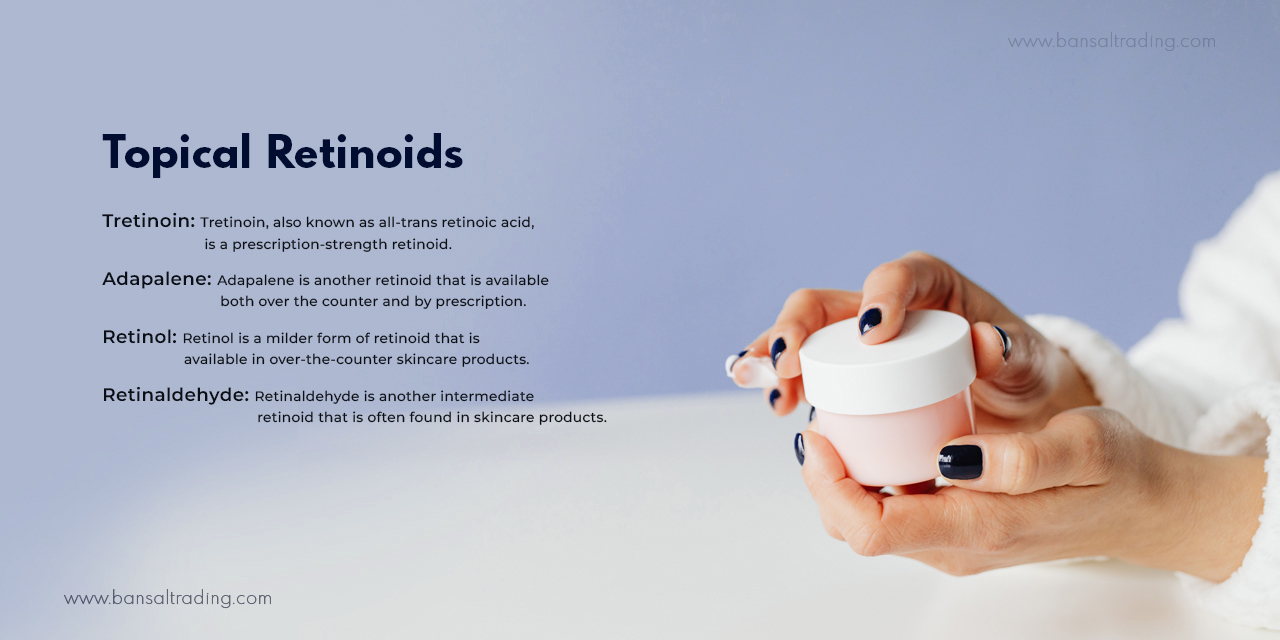
- Tretinoin: Tretinoin, also known as all-trans retinoic acid, is a prescription-strength retinoid.
- Adapalene: Adapalene is another retinoid that is available both over the counter and by prescription.
- Retinol: Retinol is a milder form of retinoid that is available in over-the-counter skincare products.
- Retinaldehyde: Retinaldehyde is another intermediate retinoid that is often found in skincare products.
Retinol vs. Retinoid
Retinol and retinoids are often used interchangeably, but they are slightly different. Retinol is a specific form of vitamin A, while retinoid is a broader term that encompasses all vitamin A derivatives. Retinol is a milder form of retinoid that needs to be converted into retinoic acid by the skin before it can exert its effects. On the other hand, certain retinoids such as tretinoin and adapalene are already in active form and can be more potent.
Retinoids are typically available through prescription, while retinol benefits are found in over-the-counter skincare products. Retinoids for the skin are a class of compounds derived from vitamin A that offer numerous benefits for the skin. Natural retinoids are compounds derived from plant sources that offer similar benefits to synthetic retinol.
Retinol Benefits:
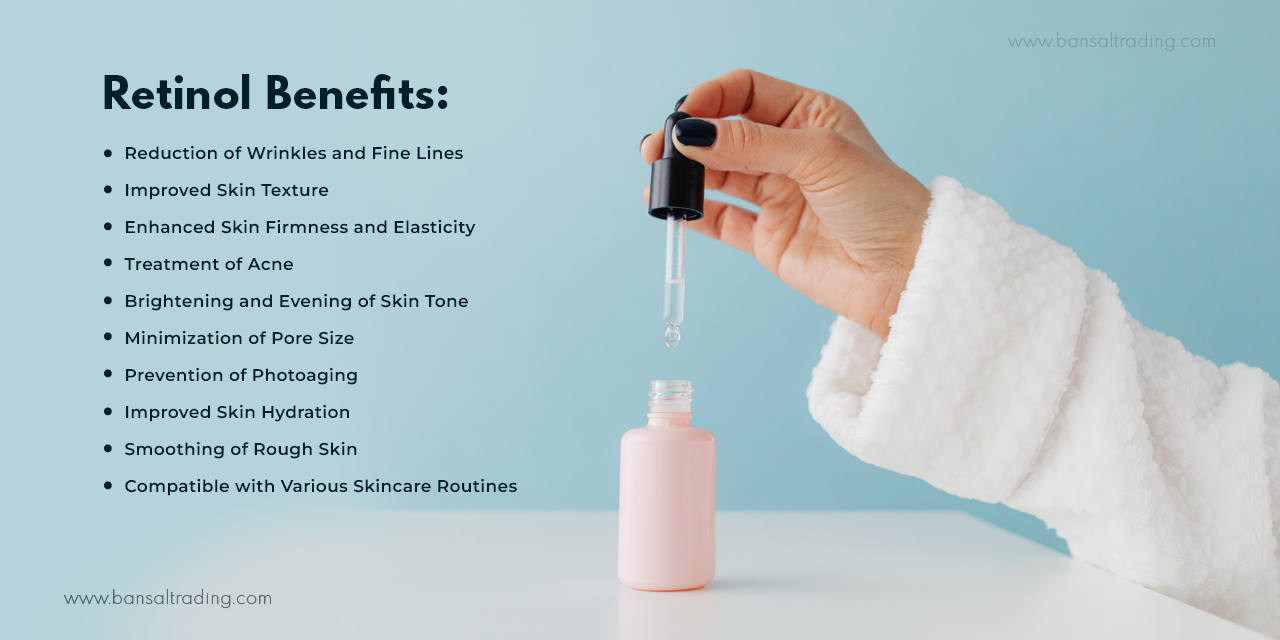
- Reduction of Wrinkles and Fine Lines: Retinol is widely recognized for its ability to diminish the appearance of wrinkles and fine lines. By stimulating collagen production and promoting cell turnover, retinol helps to smooth out the skin and reduce the depth of wrinkles.
- Improved Skin Texture: Retinol promotes exfoliation, allowing for the removal of dead skin cells and the revealing of smoother, more radiant skin. It helps to refine the skin’s texture, making it appear smoother and more even.
- Enhanced Skin Firmness and Elasticity: Retinol stimulates collagen synthesis, which is essential for maintaining skin firmness and elasticity. Regular use of retinol can help improve skin’s elasticity, making it appear more toned and youthful.
- Treatment of Acne: Retinol for acne treatment is effective due to its exfoliating and anti-inflammatory properties. It helps to unclog pores, reduce excess oil production, and prevent the formation of acne-causing bacteria, resulting in clearer skin and fewer breakouts.
- Brightening and Evening of Skin Tone: Retinol can help fade dark spots, hyperpigmentation, and sun damage, leading to a more even skin tone and a brighter complexion. It inhibits the production of melanin, the pigment responsible for dark spots and uneven skin tone.
- Minimization of Pore Size: Regular use of retinol can help reduce the appearance of enlarged pores by promoting cell turnover and preventing the buildup of debris within the pores. This can result in a smoother and more refined complexion.
- Prevention of Photoaging: Retinol has antioxidant properties that help protect the skin from the damaging effects of UV radiation and environmental stressors. It helps to neutralize free radicals and prevent premature ageing caused by sun exposure.
- Improved Skin Hydration: Retinol helps strengthen the skin’s moisture barrier, preventing water loss and improving overall hydration. It can help retain moisture within the skin, making it appear plump and hydrated.
- Smoothing of Rough Skin: Retinol can effectively smooth rough patches of skin, such as those caused by keratosis pilaris or dryness. It promotes gentle exfoliation, revealing softer and smoother skin.
- Compatible with Various Skincare Routines: Retinol can be incorporated into various skincare routines and is compatible with other active ingredients. It can be used alongside moisturizers, antioxidants, and sunscreen to enhance its benefits and provide comprehensive skin care.
It’s important to note that retinol may cause skin sensitivity and initial irritation, so it’s advisable to start with a lower concentration and gradually increase usage. Additionally, it is essential to use sunscreen during the day when using retinol, as it can increase skin sensitivity to UV radiation.
For a comprehensive approach to skincare, consider seeking products that blend retinol with soothing ingredients like glycerine and explore dimer acid suppliers in India to find formulations that promote skin health while minimizing potential side effects
Also Read: Natural Colorants For Cosmetics: What You Need To Know
Conclusion
The availability of retinol and other skincare ingredients is supported by chemical distributors in Delhi. These entities ensure the sourcing, distribution, and production of high-quality raw materials, supporting the growth of the skincare industry in the region. Cosmetic Raw Material Suppliers In India offer a wide range of ingredients, including retinol, while chemical distributors facilitate a smooth supply chain.
BTC_WEB_ADMIN



